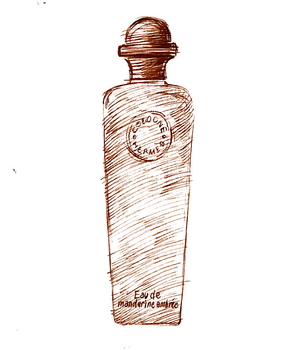Tagged With ‘passion fruit’
Hermès
Eau de Mandarine Ambrée
1 June, 2014
 Now this is fun. Eau de Mandarine Ambrée isn’t perhaps the most sophisticated perfume in the world, but it’s a jolly, cheering little scent, that smells sweet and zesty and pretty much exactly like mandarin juice when you first spray it on. It was launched in 2013, at the same time as Eau de Narcisse Bleu, and brings the number of Hermès colognes up to five (the other three being Eau d’Orange Verte, Eau de Gentiane Blanche and Eau de Pamplemousse Rose).
Now this is fun. Eau de Mandarine Ambrée isn’t perhaps the most sophisticated perfume in the world, but it’s a jolly, cheering little scent, that smells sweet and zesty and pretty much exactly like mandarin juice when you first spray it on. It was launched in 2013, at the same time as Eau de Narcisse Bleu, and brings the number of Hermès colognes up to five (the other three being Eau d’Orange Verte, Eau de Gentiane Blanche and Eau de Pamplemousse Rose).
Like all the more recent Hermès perfumes it was created by Jean-Claude Ellena, whose celebrity status says much about how the industry has changed over the last decade or so – in the past no one would have known his name. His perfumes are nearly always interesting, if not always terrifically commercial, and Hermès seem to have given him licence (if you’ll forgive the pun) to follow his own nose and see where it takes him, especially with the colognes and it Hermessences range – see my review of Vétiver Tonka.
Ellena is very interested in food, and like quite a few of his perfumes, Eau de Mandarine Ambrée reminds me of cooking smells: nice cooking smells, that is. In this case it reminds me of the ugli-fruit marmalade that Roy made this year, which is very nice in its own way, but lacks the tartness of Seville-orange marmalade, and tastes a bit too sweet and jammy as a result.
Still, you could do far worse than start your day with Eau de Mandarine Ambrée. It’s light and refreshing and puts a smile on your face, yet it’s longer-lasting than most citrus-based colognes. This seems to be because Ellena has combined mandarin with a bit of passion-fruit extract and what’s known in the perfume trade as amber (thus Mandarine Ambrée).
‘Amber’ is one of those confusing terms that gives perfumery a bad name: it’s nothing to do with amber, the fossilised resin, or ambergris, the strange waxy lumps that whales occasionally cough up after swallowing too many cuttlefish (I kid you not), which develop a wonderful aroma only after bobbing around in the sea for a few years.
For perfumers, ‘amber’ refers to a careful blend of several ingredients, usually vanilla, benzoin and labdanum, which together give a sweet, slightly resinous and powdery smell. Ellena himself says that ‘I can think of no smell more joyful than mandarin, more mellow than amber,’ and I guess it’s the amber that helps Eau de Mandarine Ambrée last as long as it does.
Would I wear it a lot? Personally I prefer the sharper smells of colognes like Monsieur Balmain and Eau d’Orange Verte, but for anyone who likes something a bit sweeter and softer then Eau de Mandarine Ambrée would be a very happy choice.